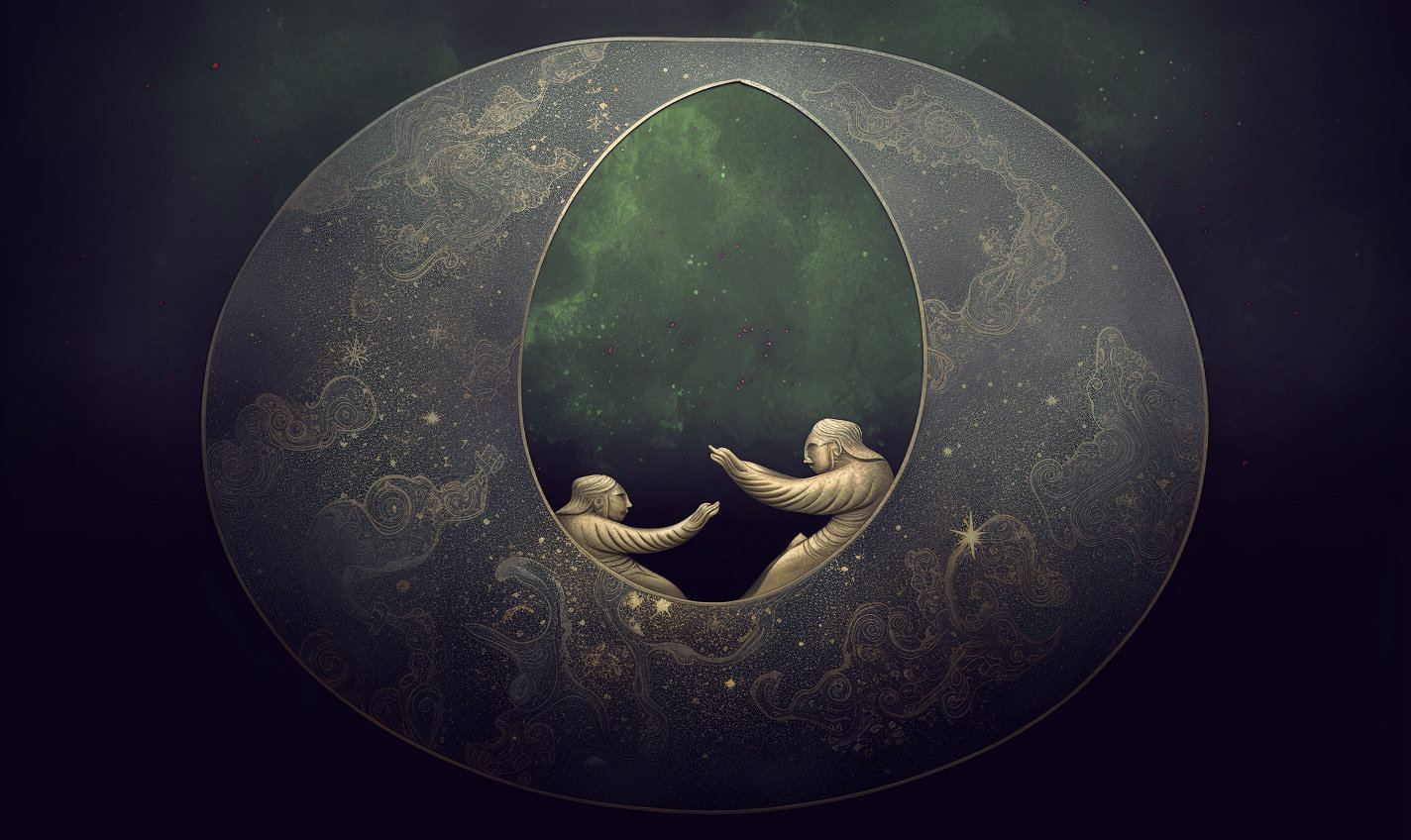Narrative Consciousness
To think is to talk to someone who isn't there

I frequently speak ill of narrative consciousness and treat it as an obstacle - and this it certainly is. Ceaseless, aimless linguistic hallucination characterizes so much of what it means to be an anxious modern creature. But like every affliction, there is a way to make it an asset. Narrative consciousness must be embraced as a kind of madness: all "thinking" is talking to someone who is not there. The first meaning of Logos was merely "bundle", "what is gathered", and later it meant "story", and only much later did it mean anything like "logic" or "principle" - in other words, the word itself is a tall tale. Our private bouts of reason address a tribe that is not there. The philosopher's path out of this madness has been to talk to ourselves all the more: to deepen the conversation, to make it fruitful, to lean into the solipsistic corkscrew until we come out the other end - finally understanding that this madness has nothing to do with us personally, and is common to what it means to be human. We are surrounded by anxious dreamers, who fear they are the only ones who dream with eyes open. So much of what I see when I look into the frightened eyes of the human world, is the fear that only they are afflicted with an incommensurate subjectivity, that it is they alone who must expend so much effort to seem to be normal, that it they alone who seem to stand on the edge of a precipice from which a cacophony of voices emerge, wrapping them in a many-colored coat of desires which they throw back down the hole and disown. But narrative consciousness is the favored servant of the pharaoh: the one who can interpret dreams, the one who is always lost within a dream, the one who speaks in riddles as a first language. Right in the center of the most dull and monotonous mental activity, lies the brilliance of unconscious thought. The human world is like a million twitching madmen shaking hands and doing business in the radioactive aftermath of a disaster: they go on as though it weren't there, as though not acknowledging it were essential to the ritual. And yet this human creature is so terribly competent, so fibrous and difficult to defeat: it will discover the minimum expenditure to achieve its ends, the least distance path, the least risky strategy. For in the field of petty strategizing, our madness serves us best: no other animal can compete with us in the arts of hysterical displacement, conversion, covert gratification, the return of the repressed, and every other means of achieving social ends while minimizing risk. Why do we think so much? Because we strategize so much. Because narrative consciousness is a social function, and the aim of all sociality is hierarchical advantage through symbolic means. Narrative consciousness is inherently linguistic because language has its origin in the symbolic character of sociality. When we talk to ourselves, we are strategizing, we are preparing, we are rehearsing, we are altering memories, we are erasing humiliations, we are talking ourselves back into confidence - we are licking our wounds, gloating, gossiping, and preparing for the next round. And yet this essential loneliness and desperation can be made to serve other purposes: it can be bent backwards into a truth function, because the discovery of truth is a creative act - and all creation requires confabulation.
Obviously my own thinking and writing into which I pour so much of who I am, would not exist without this narrative weaponry. Despite all my admonitions against its glorification, clearly it is the divine madness which makes this species so interesting. We are infected with symbol: what gives us mastery has also enslaved us. We are the weeping, laughing ape: arguing with voices, afraid of the past, plotting for the future - almost a lost cause. The only liberation is affirmation: if we are to be forever thinking, let us think well. If we are to be forever hearing voices, let it be a good voice. We must find a way out of the labyrinth of voices into the chorus of days: "The grass is a chorus of mundane days, piercing me blade by blade until my body rises."
Narrative consciousness must not be allowed the delusion of control: its proper functioning is to be constantly weaving a tale and leaving a trail of coherent memories behind it. But the illusion that guidance and decision come from this audible voice should not be encouraged: it is the unconscious processes which must be clarified, reified, and amplified - a good story thrives because of its symbolic silences, which grow in the space between the telling and the hearing. The proper function of conscious narratization is analysis: it is adept at dividing into parts, loosening, undoing. As a diagnostic routine, it overexcites unconscious symbolic constellation such that novel configurations become possible: this is the meaning of "talk therapy", this is why "just talking about it" can change so much. But the creative and restorative power is not due to conscious process: narrative consciousness is primarily a critic. When it praises, beware. When it finds fault, pay attention. When it asks good questions, now it is functioning. The narrative voice which asks probing questions leaves behind it a wake of unconscious coherences like a scalpel slicing through regenerative flesh. Every time we slice, our insight deepens: because the crystallinity left behind, lets us see deeper.
Narrative consciousness likely developed as an excess byproduct of the ability to form complex goal-oriented behaviors: sustained selective repression is necessary for a technologically dependent creature, who must learn most of his skills second-hand and perform them over long periods. The human instinct is to learn complex behaviors through imitation, and narrative consciousness begins as the introjected imitation of social function: children begin their career of "thinking" by talking aloud to themselves as they play, narrating what they do... To think is to play the omniscient narrator.
Narrative consciousness is the strange feedback between the speech centers and the auditory cortex: a crude but effective behavioral organizing function, arising out of the need for highly specialized behavior in absence of instinctual coherence.
Is narrative consciousness an emergent property of linguistic capacity? Is it an inevitable development, once language becomes so overdeveloped? Or is it rather the other way round? Do linguistic faculty and linguistic dependence emerge simultaneously from the common problem of instinctual incoherence? This is where almost no one understands my evolutionary psychology: the human creature is helpless in light of his instinctual weakening, and only becomes strong again due to his delusions.
Let me say it again. It's our talent for useful hallucination that makes us indomitable: anyone who's treated schizophrenia with an open mind eventually learns that every bit of crazy is an ingenious solution to the insoluble. This is part of why my work's notoriety has this quality of a slow-burn: most cannot, will not hear me - the defenses are orders of magnitude stronger than any brew of poetry and rhetoric I can cook. No matter how much beauty I conjure, no matter how many spirits I set dancing to my tune, no matter if I get the pores of the earth to tremble - once a schizophrenic patient told me, in the middle of the most powerful session of my life thus far, that the room was shaking - I cannot defeat those defenses before they're ready to lower on their own: the power was all his, I merely made him feel safe. But if I can make a schizophrenic feel heard, witnessed, and safe, why then all this attack upon you neurotics? It's my instinct: y'all need your assumptions and certainties attacked, from every conceivable angle. Y'all are doing it wrong: liberation and joy lies on the other side of that white-knuckle grip, that mile-wide moat of denial, that ever-present chant of sanity, normalcy, morality, safety, blamelessness, sanity, normalcy, morality...
We hear voices. But what does that have to do with being conscious? Asked another way, how do these voices attract attention? Firstly by being so loud: they overwhelm other systems. Secondly by a long tail of reflection: the feedback between speech and auditory centers leaves traces, stutters, and echoes.
And why do we talk to ourselves? Because we are lonely, and because we are resentful. Narrative consciousness is always ersatz sociality: it is either rehearsal, preparation, or memory confabulation. Our famed "reflective reason" is largely rehearsal, largely as-if posturing in front of the mirror of our own witness - and the rest of "immortal reason" is just fabricated ex post facto. The logicians are ever on about the same tired gag: they don't want us to know that they sit in smelly closeted rooms having smelly closeted thoughts. They want us to believe in their tired childish fantasies of perfect immateriality and transcendent reason: only so could the reality of their bodily misery be justified - or ignored.
But again is this narrative consciousness, this loud voice, this cogito, somehow an emergent criticality of the social communicative function? Is it similarly a diagnostic routine? Resentment gives us the clue: we never talk to ourselves so loudly and compulsively, as when we are boiling with resentment. Dysfunctional social contexts and their symptoms - namely loneliness, alienation, self-loathing - induces a diagnostic hyperactivity within the social systems: thus we hallucinate voices, we "think" constantly, we rehearse, analyze, and prepare. We are spindoctors of a failing tribe, each of us a lost cause in a tribe that never was: the more stressed and abandoned the human creature feels, the louder and more insistent these voices.
The deeply social aspect of narrative consciousness should be emphasized: the narrative I is an introjection of the dialogic You.
Therefore narrative consciousness retains a special genetic relation to repression: talking to oneself is partly a byproduct of the deferral routine every tribal creature full of compromises needs - "La dee da, I'm busy with something I'm not ashamed of, don't mind me". Thus personal narration is not only an instinctual stopgap but a disguise for sneaky ape activities: if you look self-absorbed in an uninteresting chore, you are likely to go unnoticed and thus unharassed. Study the conflict resolution rituals of the gorilla to see it in action: the principal idea of submission behavior is to sedate your superior with his own tribal instincts. Looking thoughtful is to the human what sniffing wieners is to dogs. This also provides another clue why "thinking" usually involves seeing oneself from the outside: contextualization is as important to purposeful behavior, as it is to fooling your wouldbe rivals and persecutors... Paranoia and the capacity for thought are mutually conditioning: it's always the outliers and losers who think the most - something philosophers have not been honest about.
So much of our thinking boils down to this recurrent question: "Who am I in relation to the group?" Status revaluation is a constant habit of nervous apes. The rehearsal of likely future scenarios and the delusional repair of past failures: this is one of those things everyone knows about the human condition but does not address. If you admit how much time you spend arguing with voices, "they" will come and take you away.
Confabulation is an important factor in all "consciousness". But confabulation largely occurs in the realm of narrative episodic memory, not sensory coherence: the coherent actionable sensorium has nothing to do with auditory hallucination - in plainer terms, "thinking" rarely makes you smarter - a very old absurdity I must continually underline.
Except perhaps that conscious attention to the sensory whole is part of the diagnostic, and thus paranoia: forming a paranoid transitory Merkwelt is the original function of becoming conscious, because it's about addressing a failure in an otherwise efficient unconscious process. "What's wrong here? Who am I?" This is the subtle connective tissue between apperception and narration, and why I permit myself the term "consciousness" at all: both are confabulatory in the sense that reparative contextualization requires fictional stopgaps - white lies are an essential element to functional calibration. Did you follow that or did your egoic defenses prevent it?
That consciousness is a diagnostic routine is surely evident in its somatic apperceptive form, but how does the diagnostic role frame what narrative consciousness does? The idea is that an animal "thinks" protolinguistically when it reevaluates instinctual targeting: doubt about the present course is sometimes needed, and thus potentially grounding out and resetting an instinctual process. The principal insight is that instinctual targeting is inherently symbolic - the symbol emerges from the recognition function: thus symbolic reasoning is as old as any instinct, and therefore doubt is as old as both. Next time you see a robin flicking over leaves in a lawn hunting for worms, watch for a moment of misfire and hesitation: that's the birthplace of consciousness.
A word about the famous "thalamocortical loop": its function seems to be to restrict access to the cortex and thereby modulate cortical feedback. Thus has this function attracted attention as a neural correlate to conscious activity: but what's missing, is the insight that the kind of socially mediated narrative consciousness induced by the not merely verbal but written computer-administered multiple-choice playacting scenarios of most neuropsychology experiments, requires massive inhibition in all other systems to function. "Thinking" like this precludes a great deal else, because it is much more expensive than it seems to us. But most of these researchers have never considered that the kind of thinking they're used to is actually auditory hallucination, and that silently reading printed text involves a minimum of these steps: visual resolution of shapes into recognized words; corresponding stimulation of speech centers such that a simulation of speech is produced while inhibiting the motor actuation; "hearing" this hallucinated voice at the auditory center, which then broadcasts comprehension to many other locales - none of which is conscious at all! By the time apperception of the process can take place, all that's left is the echo... Take none of the talk about consciousness seriously, which does not appreciate how little consciousness is able to embrace: the great mystery is not reflexive representation, it is unconscious presentation.
Why do we even call this narration "consciousness", if it proceeds so often unconsciously? Because again it's a matter of degree. Most of what the average human being is conscious of, is merely painfully loud. There are two ways to wake a doped sleeper: shouting and kicking. In more refined language, we speak of narration and apperception as redundant marking and potential nociception - again, shouting and kicking! But the crass butt-end of humanity is revealing - not merely comedic relief but comedic revelation: Dogberry and his nightwatchmen report the truth, if assbackward.
Consciousness is no more mysterious and wonderful than anything else the organism does. That there's so much flattery and low-bowing and pushing-each-other-aside surrounding the palanquin it seems to ride in, is because two primary forces of apenature coincide here: fear of abandonment and vanity. The immortal soul is dead, the tribe is dead, the nationstate is dying, the nuclear family is dying: what's left to hide our nakedness? What's left as consolation? "Personal identity" is left: and because "consciousness" seems to be the most scientific and unassailable abstraction of this erstwhile soul, it is vigorously and even viciously defended - after all my laser-guided diatribe and moral assassination, the only nasty feedback I've received so far was in reaction to my dismissal of that holy cow, the one with "consciousness" painted over its brow.
Consciousness promises security against annihilation: cogito ergo sum is formulated precisely. The reason consciousness is invoked as the answer to the absurd question, "do I exist?", is because the authority of a hallucinated voice is derived from the social function: inclusion is existence. If someone is talking to you, you're not yet abandoned. Thus is consciousness portrayed as mysterious, ineffable, and irreducible by people who have no ability to feel such things: it is proof of membership that cannot be taken away. This is the secret behind the modern Buddhist's fearful concern with "no-self": the promise of relief from endless anxiety wrapped in the threat of abandonment - they lurch and grimace around this promise like Kubrick's monkeys around the monolith.
But as soon as the ape is included, it wants more. One of the chief charms of this fickle word "consciousness", is identification with the most impressive feats of humanity: we would like this imaginary unity to be solely responsible for all the technological wonders of civilization. We want the fount of all possible intelligence and the loud compulsive voices we live with, to be one and the same. In fact we feel defensive when confronted with the variety and depth of intelligence all of terrestrial life possesses as birthright: and therefore does a contrary and apesick ape such as myself, feel compelled to preach this bad news. But those who know, know it as the best of news: we are not alone in our madness, and while this madness may be incurable, it is also laughable...
The famous "unity of consciousness" is a shallow and easily displaced illusion: it's the first piece of unlearning, and something every student of any promise quickly makes peace with. It's not even an illusion: it's a bad habit, a lack of honesty, a linguistic artifact, and an obtuse theoretical assumption which falls apart at the merest touch. Anyone who drones on about consciousness as "the totality of subjective experience" as though they were gazing into a kitschy snowglobe, as though their daily experience were an enchanting bedtime story, as though doubt, loathing, compulsion, and contradiction did not color vast expanses of their actual "subjective experience" - is expressing a wish, not an observation. So when they sit down in their pompous, awkward way to write about such a thing, they are not beginning to tell lies, they are sewing up the edges of a gaudy costume patched together from years of shameful secret skittering and frittering, as though a frantic nocturnal mouse fantasized about spending its days as a fat cat in the sun.
Why is truth so hard to tell? But it's rarely the first truth which is so hard: it's the second and third that we fear. Every little defended lie is a dam holding back a flood. This is the reason for deathbed confessions: finally it's possible to unburden oneself without having to face what was really frightening - the cascade of truth, the task of living up to one's honesty.
Do not doubt therefore, that the human creature is highly adept at detecting which denials are essential to their beaverdam - and precisely when and where. The human creature could not be such a skilled unconscious liar if it did not also unconsciously know what is true. Everyone possesses the dowsing rod of truth: the only question is, what's the social value of truth? The truth is, not much - hard truths are generally reserved for vicious gossip, the secret ingredient of effective slander, and dirty jokes.
In my last book, The Moral Disease, I made the distinction between narrative and apperceptive consciousness. This can be construed as "hearing what you think", and "seeing what you feel". What immediately becomes clear is that there must be an apperceptive aspect to what I call narrative consciousness: most talk to oneself is actually unconscious, and it requires years of practice to effectively listen to this talk. To be conscious of internal narration is therefore a kind of dialogue, in that this listener also spawns responses - certainly his presence alters the monologue. This is what I mean when I say that you must learn to talk to yourself and not someone else. To put this in neuroanatomical terms, this "listener" is most likely constituted by the auditory cortex and its involvement in thalamic feedback, such that the auditory center "listens" to the speech center, while this "silent speech" is maximally exploited to generate affective coherence leading to purposive behavior in absence of the instinctual coherence the rest of animalia still has. In other words, as my good readers will already know, narrative consciousness is a result of frustrated instinct and thus amplified by realized modernity.
And yet it occurs to me that while I'm developing a mathematically inspired language for apperceptive proprioception, I'm content to explain narrative consciousness with abstract entities acting like miniature people in an imagined little room, as is customary among bad psychologists - almost all psychology is merely grotesque puppetry robbed of the bawdy, like a cringing Sunday school play. But why am I suddenly content with sock puppets? The potentially interesting features of narrative consciousness have to do with the semantic relations and corresponding Freudian mechanics inherent in the function of language itself: the proper investigation of the underlying structures with which narrative consciousness must deal, belong to the domain of psychoanalysis. Yet I'm content to leave this "listening" and "talking" relationship in mythopoetic terms, because the process is in essence mythopoetic. It is fundamentally a shallow illusion: we are halfmad apes talking to ourselves. That we hear an internal voice only means that we have learned to induce endogenous cheap hallucination as a kind of panacea against the ills of anxiety and frustration. The less anxious and frustrated you are, the more these voices recede, and the more spontaneous and oracular thinking becomes.
My most gifted readers will perhaps have already noticed a certain informative recursion in my style. Everything I've said about narrative consciousness has been composed in a single stroke while wandering through my desert wilderness, talking to a handheld recorder: I find I cannot do otherwise if I am to speak of this subject with any honesty. It must be demonstrated in situ. Right now I'm standing in the dark looking straight up at the band of the Milky Way poised at the zenith: "surely, in this is a metaphor for the topic" - so says the poet's intuition. Or is it the poet's greed? It will be a metaphor, therefore the glory of this spectacle becomes mine, therefore I become a mysterious hazy path from horizon to horizon: is it a bridge, or a destination? To that question, the ancients used to answer, yes. Just as they would answer concerning the value of our hallucinated voices. Is our thinking the prelude to madness or the means to wisdom? But just as with everything that lives, just as the trembling whirling of every galaxy demonstrates, one cannot be anything except by continually becoming it.


